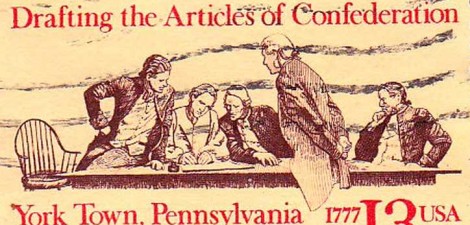Should USA Have Stuck with the Articles of Confederation?
 1776. America’s birthday. A heady, glorious period if there ever was one. The Declaration of Independence. What did the people of America want for the first 11 years of the United States of America? Well, their wishes were made known in the Articles of Confederation, our country’s first Constitution. Eleven glorious years followed.
1776. America’s birthday. A heady, glorious period if there ever was one. The Declaration of Independence. What did the people of America want for the first 11 years of the United States of America? Well, their wishes were made known in the Articles of Confederation, our country’s first Constitution. Eleven glorious years followed.
It’s not just school kids who can benefit from looking back at America’s founding principles. Adults should now and then refresh themselves about how our rights and duties of citizenship–that is, civics–came about. Don’t we see everyday the struggle to uphold the Constitution as a founding document, one that seems constantly threatened by those who want to “legislate from the bench” or reinterpret history to fit any political trendiness.
America’s first Constitution was the Articles of Confederation, drafted by men like John Hancock and Samuel Adams and John Witherspoon. Were these men revolutionaries and rebels who sought to overthrow the legal government of Colonial America? Wasn’t George Washington an officer in the British Army during the first part of his career, comparable to Robert E. Lee later who surrendered his commission to lead the Confederacy?
These days even supporters of the Constitution are considered zealots and extremists who cling to the past, much as Jews and Christians reference the Bible, now seen as outdated in our age of Facebook and Twitter and other intoxicating technology.
Instead of focusing on the limitations of the Articles of Confederation, shouldn’t we acknowledge that they addressed political issues that surely have hotbed status today. States rights are being smothered by federal control in every sector, with state governments merely the middle managers of federal policy. The IRS collects hard-earned dollars from the citizenry, then launders it with political correctness before trickling it back down to the local level.
Members of Congress seem hardly distinguishable from each other, both parties being locked into a liberal centrism that is more fiscal than anchored in traditional values. And look at the US Supreme Court today: a handful of unelected judges handpicked by the president to amplify his power alone.
To be sure, during those first 11 years, states didn’t always agree. Nor should they have. Debate and dissent might be badmouthed today, but it was a positive dialectic back then. Enter federalism as an overweening force that can override local control and identity.
The United States of America was first governed by the Articles of Confederation, which posited a states rights dreamworld that can serve as a political rudder for our nation. The states, not congress, had the power to levy and collect taxes. The states were more sovereign and could enter directly into foreign trade.
Each state had one vote, not just rule by welfare-beguiled voters in urban areas. There was no executive branch or national court system that could almost arbitrarily impose its will on states or the populace. Each state really had control over its own money and destiny, not beholden to some distant city or media-created leader.
The concept of a educational common core or indoctrination, for example, is good if consistent with local values, but bad if offered by central planners and experts attempting to impose an alien ideology. It seems likely that educators could have agreed, after wholesome debate, on a common core during the first 11 years of our nation, governed under the Articles of Confederation and Perpetual Union.

 1776. America’s birthday. A heady, glorious period if there ever was one. The Declaration of Independence. What did the people of America want for the first 11 years of the United States of America? Well, their wishes were made known in the Articles of Confederation, our country’s first Constitution. Eleven glorious years followed.
1776. America’s birthday. A heady, glorious period if there ever was one. The Declaration of Independence. What did the people of America want for the first 11 years of the United States of America? Well, their wishes were made known in the Articles of Confederation, our country’s first Constitution. Eleven glorious years followed.